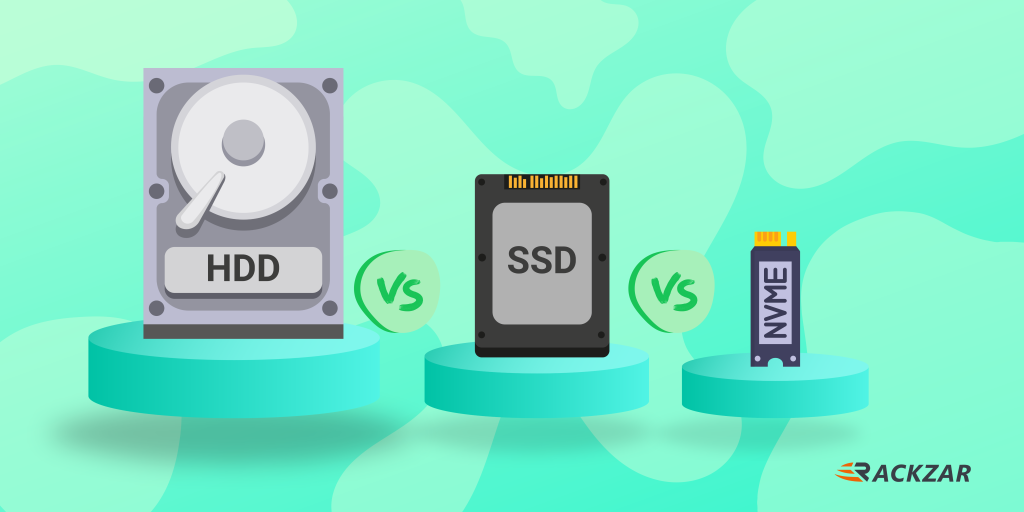
In today’s digital landscape, rapid data access, quick loading times, and rock-solid reliability are crucial for website performance and efficiency. When powering speedy WordPress hosting, the choice of storage disk is a pivotal factor. Web hosting service providers need to consider various factors such as data access speed, reliability, and cost when selecting the type of disk for their servers.
The three main types of disks used in digital storage are HDD, SSD, and NVMe. Each of these represents a distinct technology, and each has its own set of advantages and limitations. In this comprehensive analysis, we’ll explore the nuances of these storage solutions, shedding light on their respective strengths and weaknesses. This will help you make an informed decision for your storage needs. It’s important to note that the choice of disk isn’t just about capacity; it’s also about performance, reliability, and cost-effectiveness.
Performance and Reliability Analysis
Performance and reliability are two crucial factors that affect the choice between HDDs, SSDs, and NVMe drives. Traditional Hard Disk Drives (HDDs) use spinning magnetic disks and mechanical arms to read and write data. While HDDs offer large storage capacities at affordable prices, their mechanical nature makes them susceptible to wear and tear, which can lead to potential performance degradation over time. Additionally, HDDs are relatively slow compared to their solid-state counterparts, especially in terms of random access speeds.
Solid State Drives (SSDs) use flash memory technology and don’t have any moving parts. As a result, they offer faster read and write speeds compared to Hard Disk Drives (HDDs). SSDs perform exceptionally well in random access operations, leading to quicker boot times, application loading, and system responsiveness. SSDs are more resistant to physical shocks and vibrations, making them more reliable and durable. However, SSDs tend to be more expensive per gigabyte than HDDs, which makes them less cost-effective for storing large amounts of data.
NVMe (Non-Volatile Memory Express) is a cutting-edge storage technology that offers exceptional performance and efficiency. Unlike standard SSDs that use traditional SATA connections, NVMe drives utilize the PCIe interface and communicate directly with the CPU. This direct connection enables NVMe drives to achieve incredibly fast read and write speeds, which significantly reduces latency and accelerates data-intensive tasks. NVMe drives are particularly beneficial for gaming, content creation, and large-scale data processing. In addition, they consume less power and generate less heat than their SATA counterparts, which enhances their reliability and lifespan.

Cost
When deciding on a storage solution, cost is a crucial factor that needs to be considered. Hard Disk Drives (HDDs) are still the most cost-effective option in terms of cost per gigabyte. This makes them a popular choice for individuals and businesses who need to store large amounts of data for either archival or mass storage purposes while keeping to a budget. However, it’s important to balance the cost savings against the potential long-term expenses associated with slower performance and higher energy consumption.
Solid-state drives (SSDs) are known for their superior performance and reliability as compared to hard disk drives (HDDs), but they do come at a higher price point. However, with advancements in technology and increased production volumes, the cost per gigabyte of SSDs has decreased significantly in recent years. This has made SSDs more accessible to mainstream consumers, who are increasingly using them in a variety of applications, including personal computing, enterprise storage, and data centers.
NVMe drives are known to deliver unparalleled performance, but they come with a higher price tag compared to traditional SSDs. The reason behind this is the advanced technology that powers NVMe’s exceptional speed and efficiency. However, for users who prioritize top-tier performance and are willing to invest in cutting-edge technology, the productivity, responsiveness, and overall user experience benefits of NVMe may justify the additional cost.
Is it Worth Investing in NVMe
The decision of whether or not to invest in NVMe largely depends on your individual requirements and preferences. If you are looking for top-notch performance and responsiveness, particularly for activities such as gaming, content creation, and professional workloads, then NVMe is definitely worth considering. The substantial decrease in data access latency and faster read/write speeds can result in significant enhancements to your productivity and efficiency.
As the NVMe technology grows more mature and prices continue to decline, the cost premium associated with NVMe drives becomes increasingly justified due to the unparalleled performance benefits they offer. For enthusiasts, professionals, and businesses where time is money, an upfront investment in NVMe storage can lead to significant long-term gains in productivity and competitiveness.
For users who don’t need a lot of storage or are looking for a more affordable option, traditional HDDs or SATA SSDs may be the way to go. It’s important to carefully consider your storage needs, budget, and performance expectations before making a decision. Whether or not NVMe is worth the investment depends on how much you value speed, efficiency, and overall computer experience.
Conclusion
The world of digital storage is constantly evolving, with multiple options available such as HDDs, SSDs, and NVMe drives. Each of these options has its own advantages and disadvantages in terms of performance, reliability, and cost. HDDs are the most cost-effective solution for bulk storage, whereas SSDs offer faster speed and greater durability, making them an ideal choice for responsive performance applications. On the other hand, NVMe is the latest and most advanced storage technology, providing unmatched speed and efficiency for high-performance computing tasks and demanding workloads.
When deciding whether or not to invest in NVMe, it’s important to consider the performance benefits in comparison to the upfront cost and your specific usage requirements. If you prioritize speed, responsiveness, and productivity, NVMe drives can provide an exceptional computing experience. However, if your needs or budget are more limited, traditional HDDs or SATA SSDs may be a more practical option. Ultimately, the decision between HDD, SSD, and NVMe storage depends on finding the right balance between performance, reliability, and affordability that meets your individual needs.







